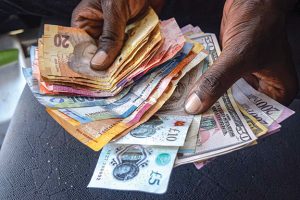Bloomberg
Zimbabwe has adopted its harshest solution yet to halt a currency crisis — ordering banks to immediately stop all lending.
The southern African nation’s President, Emmerson Mnangagwa, blames banks for flooding the financial system with excess funds, fueling a currency slide and inflation. The weekend directive to freeze loans is the latest in a series of orders since 2020 aimed at supporting the local unit and thwarting a flourishing black market. The Zimbabwe dollar, reintroduced in February 2019, has crashed 61% this year, making it the worst performing currency in the world.
The government has previously ordered the temporary shutdown of mobile-money transactions run by the largest operator, Econet Wireless Ltd., and for the Zimbabwe Stock Exchange to stop trading for five weeks. Those measures didn’t help bolster the currency. While the effect of the latest unorthodox measure is yet to be determined, cutting off banking access to companies may hit the foundering economy further.
“This is an attempt to deal with the wrong end of the problem,†said Ringisai Chikohomero, a research consultant at the Institute for Security Studies in Pretoria. The government is assuming that “lending is fueling money supply and consequently local currency depreciation. That’s misplaced. Clearly the measures are detrimental to the banking sector.â€
According to Mnangagwa, the state’s efforts to boost the economy were being undermined by “economic hitmen†who he blamed for the exchange rate depreciation.
All bank lending will be investigated, he said, without giving a timeline.
The Zimbabwe dollar was quoted at Z$275 per US dollar on the central bank’s website compared with Z$165.99 and an official rate of 108.66 at the start of the year. It changes hands for as much as Z$420 per dollar on the parallel market.
This was the first time that banks have ever been told to stop lending, said a banking executive who asked not to be identified, as lenders held a meeting with the central bank on the measures announced by Mnangagwa.
“For the avoidance of doubt, this suspension relates to all lending, whether local currency or foreign currency, to government and the private sector, including corporates, other legal entities and individuals,†the central bank said in a circular to banks on Monday.
Central bank Governor John Mangudya on Tuesday said the ban was a temporary measure to ensure “sanity.â€
The Zimbabwe National Chamber of Commerce warned that the order will knock investor confidence.
“This legitimises a parallel banking system with usurious interest rates, and no investor would be attracted to such an economy where lending can be suspended overnight,†it said in a statement. This is a step back in the “Zimbabwe is open for business†mantra, the chamber said.
The order is meant to support the local dollar amid a growing threat of the economy “dollarising†for the second time since 2009 when the country scrapped its own currency and turned to the greenback as hyperinflation soared. Policy makers are, again, battling to contain prices, with the benchmark rate at 80% and inflation that surged to 96.4% in April.
Since being reintroduced three years ago, the local unit is being sidelined by businesses and individuals in favour of the American currency, which is used to pay for everything from food to fuel, medicines and school fees.
“The government needs to let the exchange free float,†said Institute for Security Studies’ Chikohomero. “They should move away from command economics.â€
The central bank is the regulator of the country’s 19 banks in the financial services sector that cumulatively loaned Z$229.94 billion last year, according to its data. Some of the foreign lenders with operations in the country include units of the Johannesburg-based Nedbank Group Ltd. and Standard Bank Group Ltd. and the Togo-based Ecobank Transactional Inc.
An extended ban on lending risks exacerbating the nation’s economic woes and could lead to job losses, analysts and union leaders said.
“No economy would survive without lending from banks,†said Prosper Chitambara, senior researcher and economist at Labour and Economic Development Research Institute of Zimbabwe, a Harare-based economic think-tank.
 The Gulf Time Newspaper One of the finest business newspapers in the UAE brought to you by our professional writers and editors.
The Gulf Time Newspaper One of the finest business newspapers in the UAE brought to you by our professional writers and editors.
